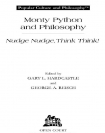Monty Python and Philosophy, Gary Hardcastle [portable ebook reader TXT] 📗

- Author: Gary Hardcastle
Book online «Monty Python and Philosophy, Gary Hardcastle [portable ebook reader TXT] 📗». Author Gary Hardcastle
Thomson’s thought experiment thus presents a clear-cut case (a violinist is attached to your body without your consent) that allows her to ask a clear-cut question (is it permissible to unplug the violinist?). The answer to this question is then applied back to the real-world issue that Thomson is addressing, and used to show what one would say in that case also. With this in hand we can then turn back to the abortion issue to clarify what our views are about other aspects of it. For example, even though we might think that abortion in the case of rape is permissible we still have to determine whether it is morally permissible to abort a fetus that was conceived through voluntary intercourse. Engaging in voluntary sex could be seen as akin to offering a fetus an invitation to “take up residence,” and if a person acts as if to invite a fetus in like this then he acquires duties towards it. But how far can we go with this argument?
In the sketch “The Visitors,” (Monty Python’s Flying Circus, Episode 9, “The Ant, an Introduction”) Arthur Name takes up Victor’s invitation to have a drink sometime and goes to his house to meet him. However, since Victor only casually invited Arthur out for a drink three years ago, no longer remembers him, and is having a romantic evening in with his girlfriend, it’s clearly unreasonable of Arthur (“Name by name but not by Nature”) to expect Victor to honor the invitation. Thus, simply because one person has issued an invitation to another doesn’t mean that he necessarily incurs any obligations as a result. Since this is so, it’s not true that if the woman acted in such a way that she could be understood as inviting in the fetus she necessarily acquires duties towards it. Now, we might think that this argument from “The Visitors” moves too fast, since whereas Arthur Name won’t die as a result of Victor not honoring his invitation, the fetus will—and this marks a moral difference between the cases. This seems right, but if we say this we’re conceding that the fact that a woman acted as if to invite the fetus into her body is not enough to establish that she has any moral duty to support it. Instead, what now seems to determine whether an abortion is morally permissible is the relative costs that would be incurred by both the woman and the fetus were she to abort or not. And once we recognize that this seems to be the question that lies at the heart of the abortion debate we can develop other philosophical thought experiments to see when, if ever, it is morally permissible to abort a fetus conceived through voluntary intercourse.
The Practical Value of Philosophical Examples
Just as the point of the discussion of the two Trolley Cases was not to argue for rule utilitarianism, the point of the above discussion is not to settle the debate over abortion once and for all. Rather, it is to show that the technique that the Pythons used to comic effect in the sketch “Police Station” is relevantly similar to that used by philosophers for a more serious purpose. Just as this sketch showed that we would be wrong to think that it is always better to report the truth to police than to tell them falsehoods, so too can philosophical thought experiments help us to test our beliefs about issues. And this is true even if the subject matter of such thought experiments apparently has nothing to do with the issue at hand. “The Visitors” sketch, for example, doesn’t have anything to do with abortion, but it can be used to show that the fact that an invitation was issued doesn’t necessarily impose any obligation on the issuer. Moreover, that many philosophical thought experiments don’t directly bear on the issues that they have been designed to illuminate is an advantage, not a drawback. Many issues of practical ethics (such as that of abortion) are emotionally charged, and so abstracting from them is useful as it enables persons to think without their judgments being clouded by emotion.
By now, it should be clear why the bizarre examples that philosophers use in arguments are not as irrelevant as some people believe. But if philosophers are so useful for their ability to use examples and thought experiments to clarify important issues, why are they commonly perceived as being ineffectual, overly-intellectual buffoons of the sort lampooned by the Pythons in the sketch that features soccer-playing philosophers, “International Philosophy” (originally presented in the “German episodes” of Monty Python’s Flying Circus, and later presented as part of Monty Python Live at the Hollywood Bowl)? Clearly, philosophers’ reputation for impracticality has a lot to do with the apparent irrelevance of the bizarre examples and thought experiments that they use. But it also has a lot to do with the irony that although philosophers use these examples to think about how to think about issues, they haven’t really taken to heart the lesson to be learned from the Pythons’ self-reflexivity in sketches like “Complaints.” Much of the Pythons’ humor comes from their being aware that they are performing, and playing on their audiences’ expectations of them as performers. They often explicitly recognize that they are performing for an audience, and incorporate what they think the audience will be thinking into their sketches. So, for example, one of the recurring





Comments (0)